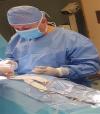Does Stroke In The Left Occipital Lobe Need Medication?

Posted on
Thu, 13 Jun 2024
Medically reviewed by
Ask A Doctor - 24x7 Medical Review Team
 Thu, 13 Jun 2024
Answered on
Thu, 13 Jun 2024
Answered on
 Tue, 16 Jul 2024
Last reviewed on
Tue, 16 Jul 2024
Last reviewed on
Question : Hi my son XXXXXXX was hospitalized recently and was discharged on Sunday 9th XXXXXXX 2024.
Initial diagnosis was a stroke in the left Occipital lobe.
Result is he is seeing blurred in the right eye. He was sent to the eye clinic which confirmed all was well with the right eye but he should return in a month to have the eye assessed for a prescription for spectacles. He was not given any prescription for the stroke on discharge. I find this strange. Could I have some advice
Initial diagnosis was a stroke in the left Occipital lobe.
Result is he is seeing blurred in the right eye. He was sent to the eye clinic which confirmed all was well with the right eye but he should return in a month to have the eye assessed for a prescription for spectacles. He was not given any prescription for the stroke on discharge. I find this strange. Could I have some advice

Present medication is Preterax 5mg /1.25mg for hypertension. His BP goes up at night. In the morning it is around 142/ 93. During the day his pressure is around
135/84.
While the CT scan didn't indicate a stroke my son is seeing blurred in the right eye. I was told by the doctor it was a stroke in the left Occipital lobe. When the first scan was done on the 27th May.
Should he be on any medication for that stroke?
Will full sight be regained in the right eye?
135/84.
While the CT scan didn't indicate a stroke my son is seeing blurred in the right eye. I was told by the doctor it was a stroke in the left Occipital lobe. When the first scan was done on the 27th May.
Should he be on any medication for that stroke?
Will full sight be regained in the right eye?
Brief Answer:
Further examinations are necessary for a correct diagnosis.
Detailed Answer:
Hello, thanks for your questions at the "Ask a Doctor" service.
I have read your question and understand your concerns.
I believe further examinations are necessary for a correct diagnosis and possible treatment.
These include a brain MRI with vascular protocol, cardiac workup to evaluate any arrhythmia, and Doppler ultrasound of the neck vessels for possible stenosis.
The sight also should improve with time, but the abovementioned examinations are necessary to get a correct diagnosis and prevent any other stroke.
Discuss with the Neurologist these issues.
Feel free to ask if you have further questions.
Further examinations are necessary for a correct diagnosis.
Detailed Answer:
Hello, thanks for your questions at the "Ask a Doctor" service.
I have read your question and understand your concerns.
I believe further examinations are necessary for a correct diagnosis and possible treatment.
These include a brain MRI with vascular protocol, cardiac workup to evaluate any arrhythmia, and Doppler ultrasound of the neck vessels for possible stenosis.
The sight also should improve with time, but the abovementioned examinations are necessary to get a correct diagnosis and prevent any other stroke.
Discuss with the Neurologist these issues.
Feel free to ask if you have further questions.
Above answer was peer-reviewed by :
Dr. Vaishalee Punj


Hi, I have provided some attachments. Please review them.
Brief Answer:
I would explain as follows.
Detailed Answer:
Hello again.
I saw the attachments about CT and CTa that you uploaded.
The supra-aortic, neck, and brain vessels are normal in these examinations.
So, the narrowing of the vessels is excluded by now.
In my opinion, the cardiac function should be evaluated for any arrhythmia.
Discuss with your Doctor these issues.
Hope this helps.
Take care.
I would explain as follows.
Detailed Answer:
Hello again.
I saw the attachments about CT and CTa that you uploaded.
The supra-aortic, neck, and brain vessels are normal in these examinations.
So, the narrowing of the vessels is excluded by now.
In my opinion, the cardiac function should be evaluated for any arrhythmia.
Discuss with your Doctor these issues.
Hope this helps.
Take care.
Above answer was peer-reviewed by :
Dr. Dr.Raju.A.T


Hi, I have provided some attachments. Please review them.
Brief Answer:
I would explain as follows.
Detailed Answer:
Hello again and thanks for the follow-up question.
I reviewed the attached examinations findings.
These imaging studies have evaluated the blood circulation of the neck vessels and brain, and resulted within normal ranges.
So, we can say that there is no vascular associated damage to the brain.
One remaining possibility is a transient ischemic attack.
I still think that cardiac work up is necessary, especially in evaluating any arrhythmia.
Hope this helps.
Discuss with your Doctor these issues.
Take care.
I would explain as follows.
Detailed Answer:
Hello again and thanks for the follow-up question.
I reviewed the attached examinations findings.
These imaging studies have evaluated the blood circulation of the neck vessels and brain, and resulted within normal ranges.
So, we can say that there is no vascular associated damage to the brain.
One remaining possibility is a transient ischemic attack.
I still think that cardiac work up is necessary, especially in evaluating any arrhythmia.
Hope this helps.
Discuss with your Doctor these issues.
Take care.
Above answer was peer-reviewed by :
Dr. Dr.Raju.A.T

Answered by

Get personalised answers from verified doctor in minutes across 80+ specialties



